 Invest Intelligence When It Realy Matters
Invest Intelligence When It Realy Matters
The Embarrassing Track Record of Robert Prechter (Part 1)
This article represents the first in a series that will discuss the realities about Robert Prechter and his track record. In this first installment I am going to show you a recent interview given by Prechter on Tech Ticker.
Before you watch this trash, I wanted to say a few things about Tech Ticker. Let me be clear. Tech Ticker is another media outlet that has stayed completely away from me, despite the fact that they know who I am and they know my track record.
How do I know this?
A reader contacted Henry Blodget and made sure he knew about me and my track record. The individual forwarded the email exchange which I will be publishing in the future, along with many other emails saved over the past few years. Moreover, I contacted Blodget numerous times in 2008 and 2009.
[I even sent him excerpts from my two books, similar to what I have sent 100s of journalists. Anyone who has read these books should now be 100% convinced that everything I have been saying about the media is true]
Of course, a responsible journalist would have found out about me by conducting thorough research. By now you should realize that journalists do NOT research their sources adequately. To do so would conflict with their mission to deceive Main Street and support the agendas of Wall Street.
Even Michael Lewis apparently never bothered to research me or come across my books when writing his hyped-up book that claimed only a small handful of people could have known to short the mortgage stocks. In fact, if Lewis had bothered to conduct proficient and independent research rather than having relied on the media, he would have seen that everyone in the world could have made a huge amount of money by reading my books. You might recall that I specifically advised readers to short Fannie, Freddie, several other mortgage stocks, the banks, GE, GM and homebuilders.
As a result, Lewis is as useless and irresponsible as everyone associated with the media. Ironically, Lewis is now a contributing writer to several media publications, precisely where he belongs.
[In case you’re wondering, I didn’t waste my time or money buying Lewis’ trash. I’m not interested in books that dramatize events AFTER the opportunities are gone. I’m only interested in books with substance and insight. I did see his interview on 60 Minutes. This is how I know about his misinformed claims]
As a caveat, I tried reading his book Liar’s Poker several years ago when I was new in the business. I hoped I would learn something relevant about the investing process of at least something relevant about the industry. After reading a couple of chapters, I was bored with the fluff and repetition and tossed the book. Yet, most investors praise the book.
As an investor, if you praise a book as a “Wall Street great,” it had better be Graham and Dodd’s Security Analysis or some other book that provides investment insight. Otherwise, truly knowledgeable investors will look at you as a fool.
How did Tech Ticker come about anyway? It was co-founded by the infamous former Merrill Lynch Internet equities analyst Henry Blodget, who, along with other greedy analysts pumped up numerous dotcom stocks to ridiculous valuations. We all know what happened soon after. So if you are looking for one of the men responsible for your losses due to the dotcom collapse, you can begin with Mr. Blodget. hblodget@businessinsider.com
As is always the case, the SEC permitted Blodget to pay a fine without admitting any wrong-doing. As part of the settlement, Blodget was banned from the securities industry.
By no means was Blodget the only villain during the dotcom era. However, part of the settlement should have banned him from working in the financial media since there really isn’t a whole lot of difference between the stock manipulation that takes place in the media versus that engaged in by Wall Street analysts.
[Note the large number of financial professionals who go over to work in the media after their careers have come to a dead end (CNBC is a great place to find several examples, despite their claims how successful they were)]
The other co-founder of Tech Ticker is a guy from one of these Internet advertising sites (I believe DoubleClick, although I am not certain) notorious for infiltrating spyware onto users’ PCs. Along with Blodget, Tech Ticker is often co-host by Aaron Task, a former thestreet.com clown under Jim Cramer. Several other former thestreet.com clowns have since joined Teck Ticker, solidifying its poor reputation, bias and censorship.
Clowns from other media publications have also joined Blodget and Co. For instance, last year, as Newsweek faced imminent bankruptcy without further assistance from its owner, The Washington Post, Sidney Harman bought the company for $1, assuring that America’s media monopoly remained in the same circle of Jewish domination. As part of the attempts to stop the massive losses, Dan Gross, former “economic editor” at Newsweek was let go.
It wasn’t long before Gross landed a new gig using his Jewish ties. Gross was offered some type of deal by Yahoo!, where he writes frequently for Yahoo! Finance, adding to the uselessness of Yahoo! content which has aided in the decline of the site. In addition, Gross also co-hosts Tech Ticker.
If you examine the staff at Tech Ticker and its affiliated websites like Business Insider, and Silicon Alley, you will notice a predominance of Jewish staff and contributors.
Without coincidence, about 90% of tech Ticker interviews over the past 3+ years (since inception) have been by given Jewish “experts,” all of them with terrible track records.
How do I know? Because I have someone on staff who has watched nearly every one of these interviews and has saved 100s.
Along with Tech Ticker, if you peruse Business Insider, you will see hundreds of contributors who submit articles, providing them with massive exposure, despite the fact that 99% of these contributors are either complete amateurs, or else they have terrible track records. It’s the same circle of con artists and deceptive individuals who have fooled so many to think they are on your side and they can be trusted, when the reality is much different.
The censorship I continue to face threatens YOUR ability to receive guidance from me, or else to receive it at 10X higher costs, so if you value my insights, I suggest you start making waves and don’t stop.
Now let’s get back to Prechter.
For those who aren’t familiar with Robert Prechter, consider yourself very fortunate, as his track record is arguably the worst of all of the media’s clowns.
Looking at his methods partly explains why his results have been so abysmal. Prechter’s Elliot Wave hocus pocus appears to resemble witch craft more than reason.
For instance, Prechter advised his subscribers to short the U.S. stock market using 200% leverage in November 2009. Since then the market has advanced by some 30%. And because Prechter has remained bearish since then, assuming you had listened to his brilliant advice, you’d be down by 60% not counting margin interest expenses.
But that’s not all. Prechter has insisted that the Dow is headed to below 1000. In fact, he has been saying this for several years. Stop and think for a moment if you had listened to him.
Let’s take a look at some of the predictions Prechter came up with after he gazing into his broken crystal ball.
(1) On June 9, 2003, Prechter stated...“…the bear market is very young. I think 18 months from now, the financial and economic landscape will be very different from what they are today. The optimists will be gone.”
(2) On June 30, 2003, Prechter stated… The Dow is currently headed down. Ultimate target: “at least below 4,000.” At the time the Dow was over 9000. Over the next four years, the Dow gained more than 5200 for gains of nearly 60%; that is if you used Prechter as a contrarian indicator.
(3) On May 11, 2004, Prechter continued with his doom and gloom warnings based on his wave hocus pocus…a “panic should set in” later this month.”
(4) On October 13, 2004, Prechter stated…“One thing I’ve repeated consistently is that the great bear market will take the DJIA at least below 1,000 and likely to below 400. Precedents for this severe a decline are the English stock prices in 1720-1722 and American stock prices in 1929-1932.”
(5) Obviously frustrated with his extremist approach, apparently Prechter decided to go with the odds, knowing that most market collapses have occurred in the month of October. On October 20, 2005, he stated…“Expect the market to develop into a crash, with panic increasing into Halloween and then culminating within hours. From that low, the market should stage a dramatic three-day bounce for wave four and then resume declining to lower lows for wave five. This decline should leave 10,000 behind for good. Investors stay in cash; speculators stay short.”
Wow, this guy sounds like a complete nut. Let me explain. There is no one in the world who can predict exact details of any sell-off, such as what Prechter has attempted with his use of words like “within hours,” and “three-day bounce.” This is truly fortune-telling at its worst.
(6) On November 25, 2009, Prechter advised his sheep to short the market using 200% leverage. This is completely irresponsible by the most lax standards of investment prudence.
(7) On January 21, 2010, Prechter states…“2010 is the year when the bear market in stocks returns in full force. …a meaningful close below [Dow] 10,489 should see a similar collapse to new bear market lows.”
(8) Then on June 17, 2010, Prechter states…“The topping process is over for the countertrend rally that started in the first quarter of 2009. The next leg lower that commenced in April should now deliver a decline that will ultimately be bigger than the 2007-2009 sell-off.”
So what happened? The same that always seems to happen when Prechter predicts a market decline; the market soared!
(9) On July 15, 2010, Prechter states… “The selling pressure will abate at times, but by the end of 2010, stock prices should be much lower. …Experienced traders should be short the S&P 500 Index…”
Now let’s have a look at the performance of the market after Prechter’s advice. After studying this chart, it should be clear that Prechter is one of the worst market forecasters in history.
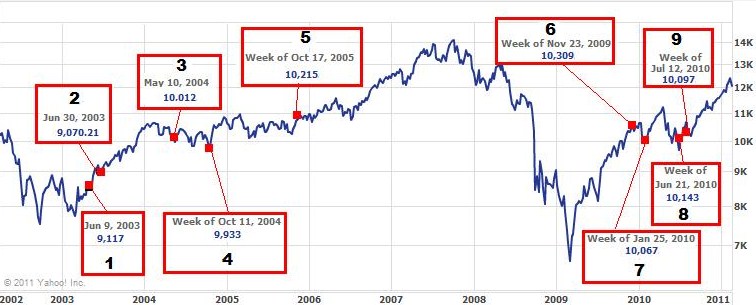
As you can see, Prechter is like the other perma-bears, who continue to cry wolf for many years as their naïve followers miss out on tremendous gains.
Inevitably, the market runs into problems as it has in the past. At that time, Prechter is right; well kind of.
You see, when the Dow was making its lows at around 6441 in March 2009, Prechter was like Schiff, Roubini, Faber and the other perma-bear clowns who insisted it would fall much lower. They advised their naïve sheep to stay out of the market while I advised investors to begin buying at the bottom.
These guys only know one direction and it’s always down, give or take a few “bear traps.” In fact, these guys have been calling the market’s 85% rise a bear trap for over a year now.
Without a doubt, I can guarantee you these extremists will all be preaching doom until the day they die. After all, a good salesman sticks to his pitch. He practices it over and over like a machine. That is precisely what these guys do.
So with so many “great” predictions, let’s see what Prechter has to say now.
I present to you the dog-and-pony act known as Tech Ticker. While you’re watching, notice how at certain points, Task and Blodget seem to be laughing at Prechter under their breath. You see, these guys realize how awful Prechter’s track record is. But they are simply riding the media gravy train.
Click Here to See the Man Whose Track Record Rivals that of Martin Weiss
Remember Weiss’ track record? Click here to see it.
Hopefully, by now you realize just how wrong Peter Schiff has been. If not, have a look here, here, here, here, here and here.
Note Prechter's witch craft-like rationale.
Did he discuss valuation?
Did he discuss relative improvements in economic data?
Did he discuss any specific forecasts?
Did he discuss any critical support levels?
Of course not! Prechter’s forecasts resemble the accuracy of a blindfolded man throwing darts.
I saved the best for last. Let’s have a look at some of the comments by viewers.
(click on images for larger view)
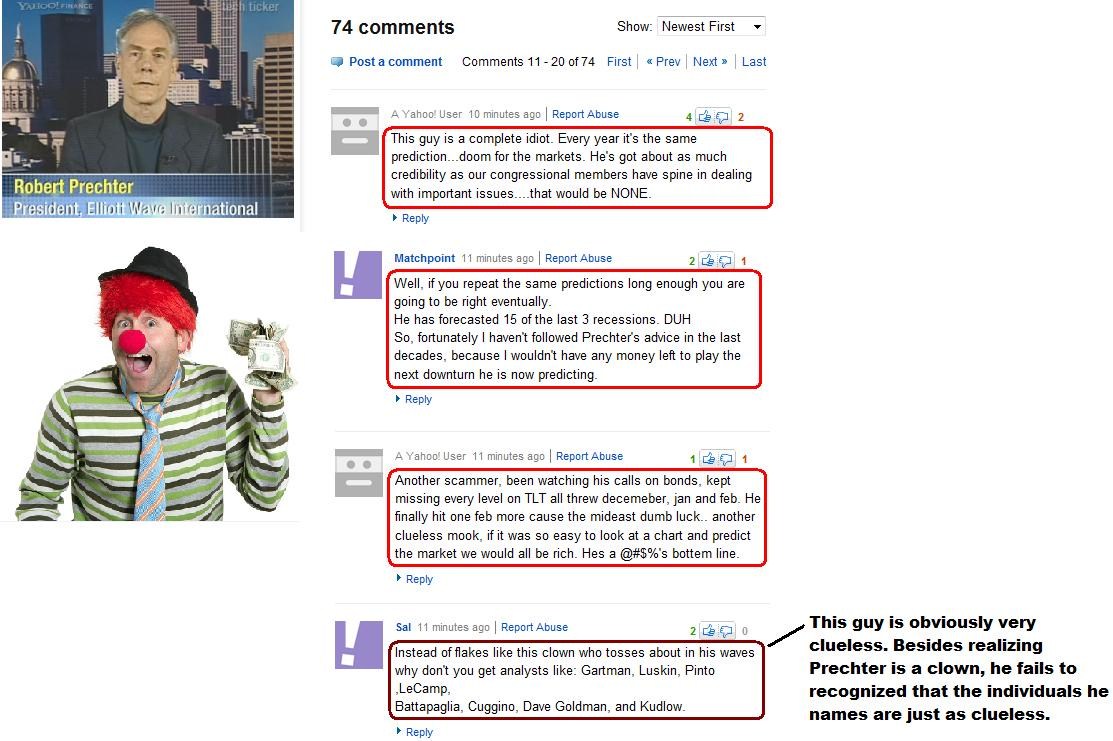


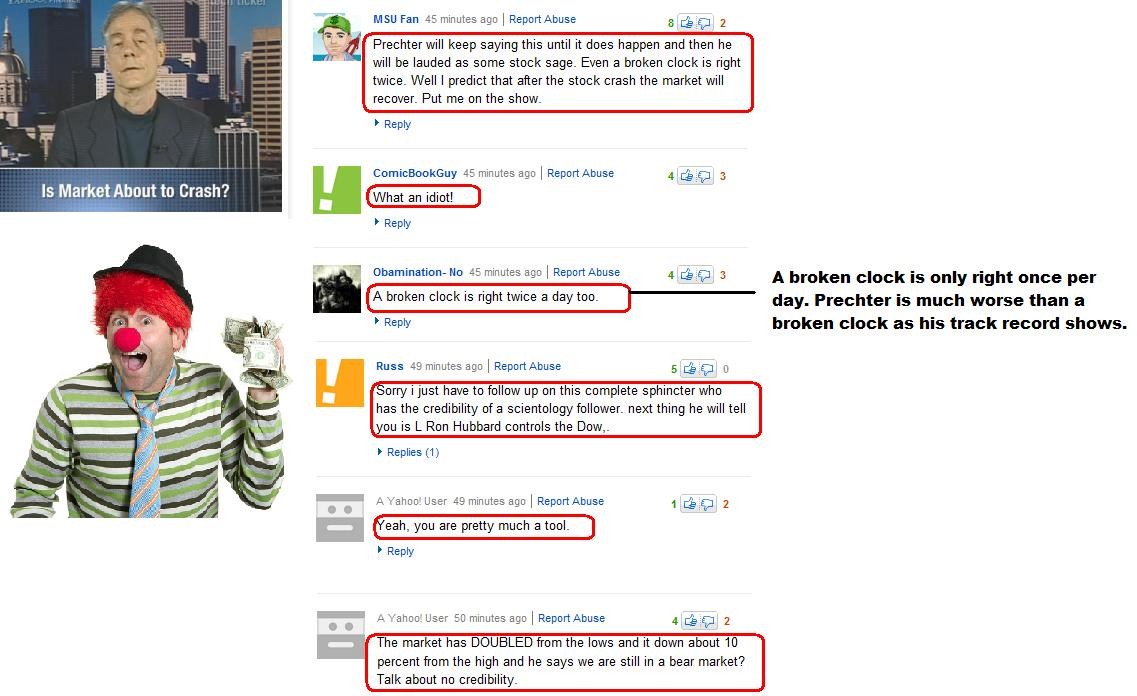

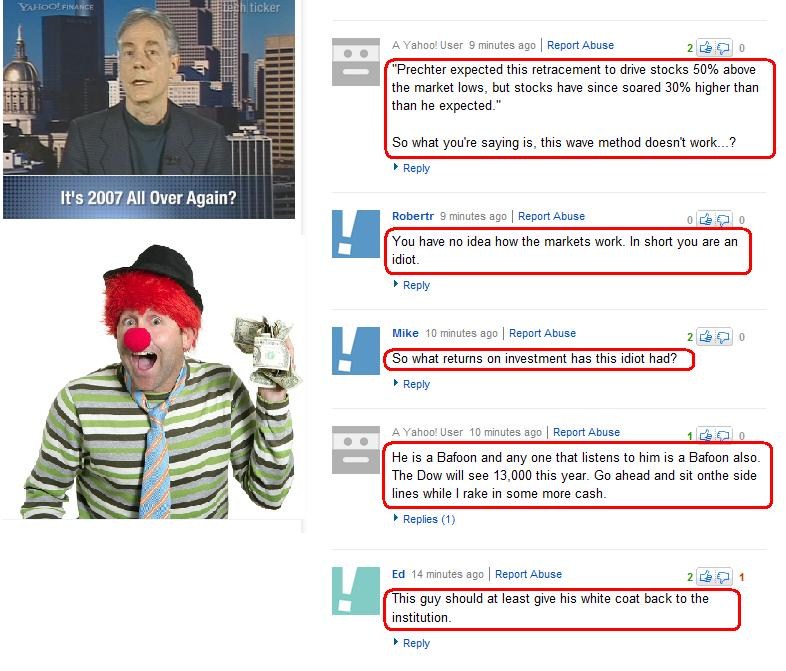
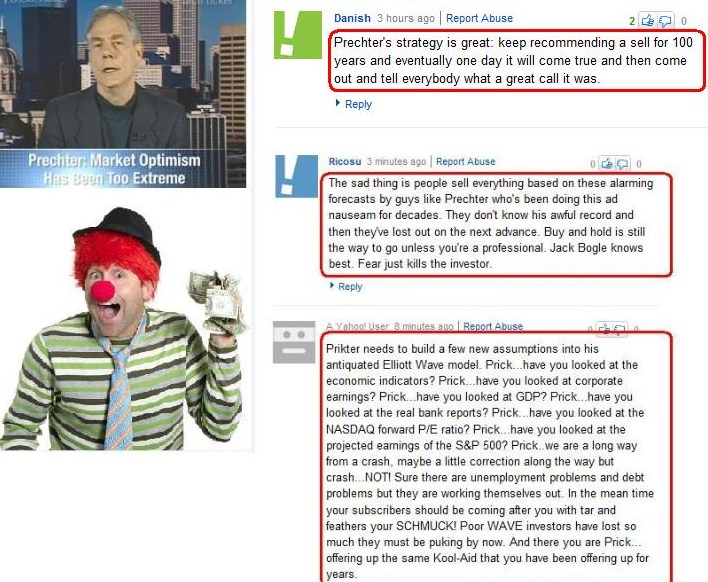
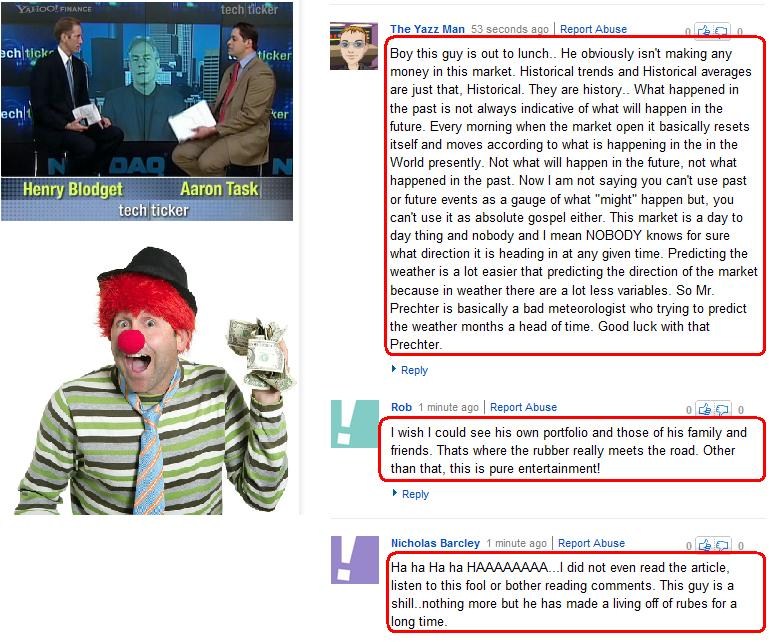
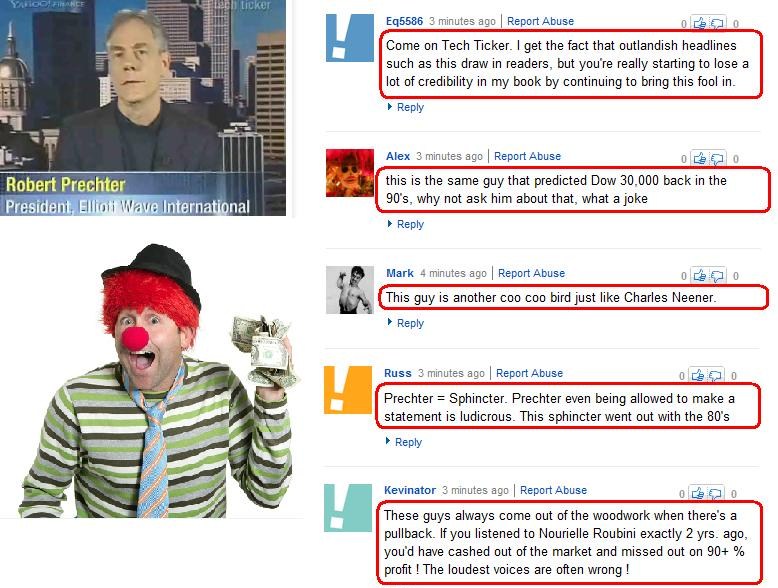

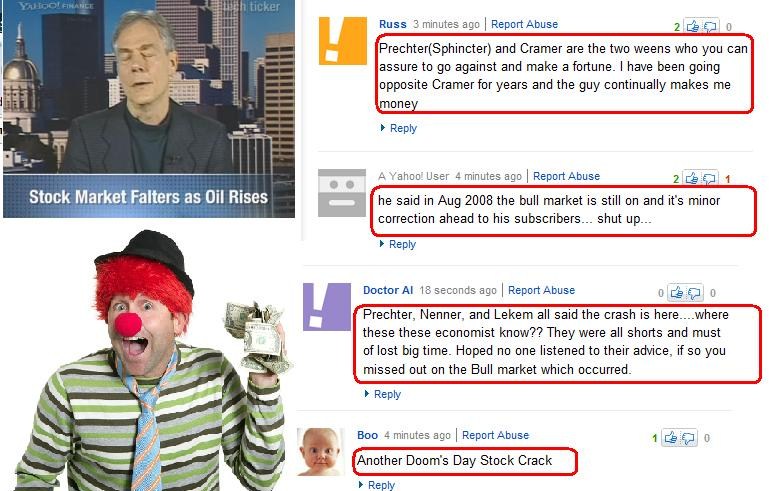
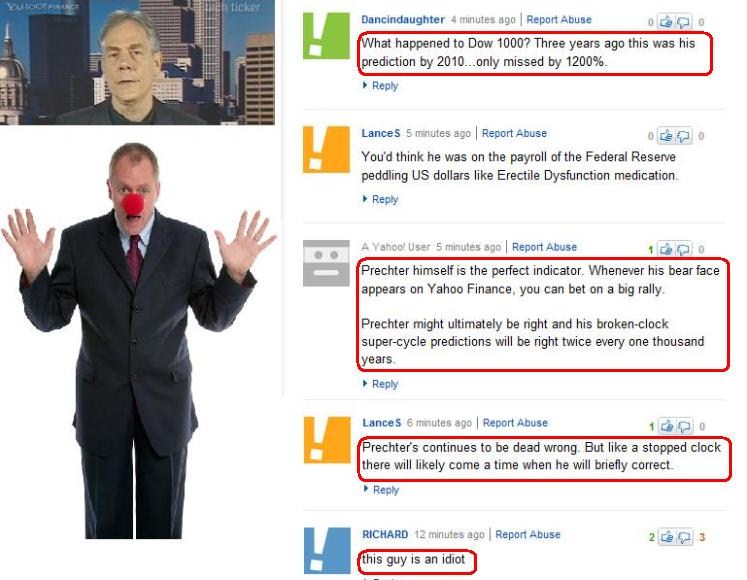
Apparently, many people are beginning to view Prechter based on his track record. This might explain why he has ramped up his advertising efforts over the past year.
Little do his subscribers know that the majority of the huge fees they are paying for his misguided forecasts are going to ads.
Of course, I can imagine that his subscribers have much bigger concerns, like the losses to their portfolio.
I encourage you to tell Tech Ticker what you think of Prechter and the rest of the clowns they air, all with the intent to screw those who are naive enough to line up for this trash.
Tech/Ticker Business Insider - 646-484-6584
CEO / Editor-in-Chief: Henry Blodget - hblodget@businessinsider.com
Clusterstock & The Money Game - 646-484-6660
Deputy Editor: Joe Weisenthal - jweisenthal@businessinsider.com
Managing Editor: John Carney - jcarney@businessinsider.com
I invite you to join other subscribers who wish to become great investors, as they learn how to navigate the financial landmines that promise to be commonplace for years to come. The best way to achieve this difficult task is to subscribe to one of our investment newsletters.
At AVA Investment Analytics, we publish 3 investment newsletters and provide customized research to financial institutions, financial advisers and serious retail investors. You can sign up without registering as a Client here.
(1) The Intelligent Investor newsletter is our flagship publication. It is the most comprehensive investment newsletter we know of in the world.
See here for more details.
See here, here, here and here for our track record.
(2) The Market Forecaster newsletter provides forecasts for the U.S. and emerging markets (excluding Russia).
See here for more details.
See here and here for our track record.
(3) The Dividend Gems newsletter provides my most highly recommended dividend securities with active management strategies, as well as discussions of other dividend securities.
See here for more details.
Or maybe you want to subscribe to Precher's insights? What about Roubini Schiff or Weiss? If not, never fear, as the list of clowns out there is endless, and you can find them interviewed in the media on a daily basis.